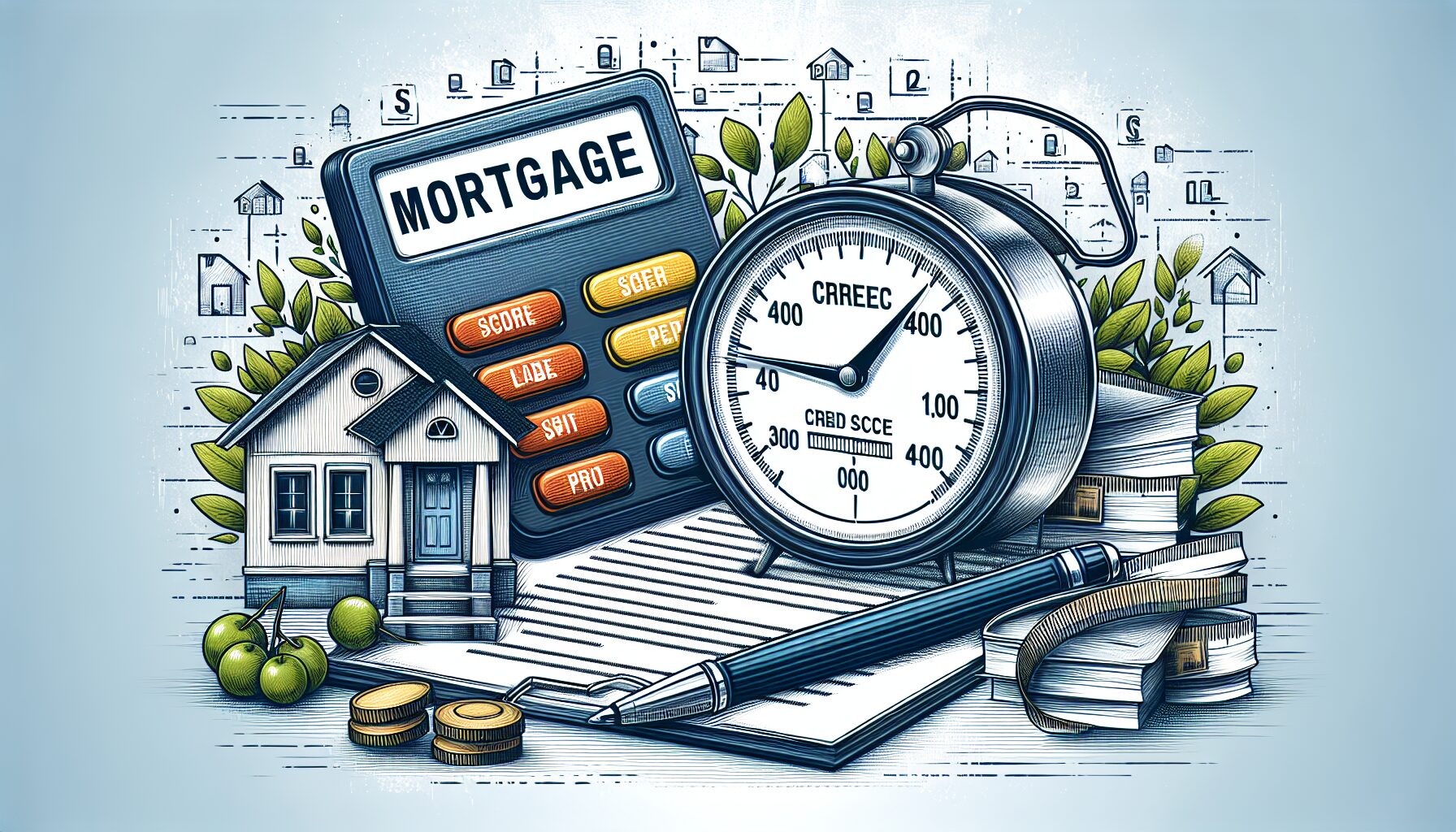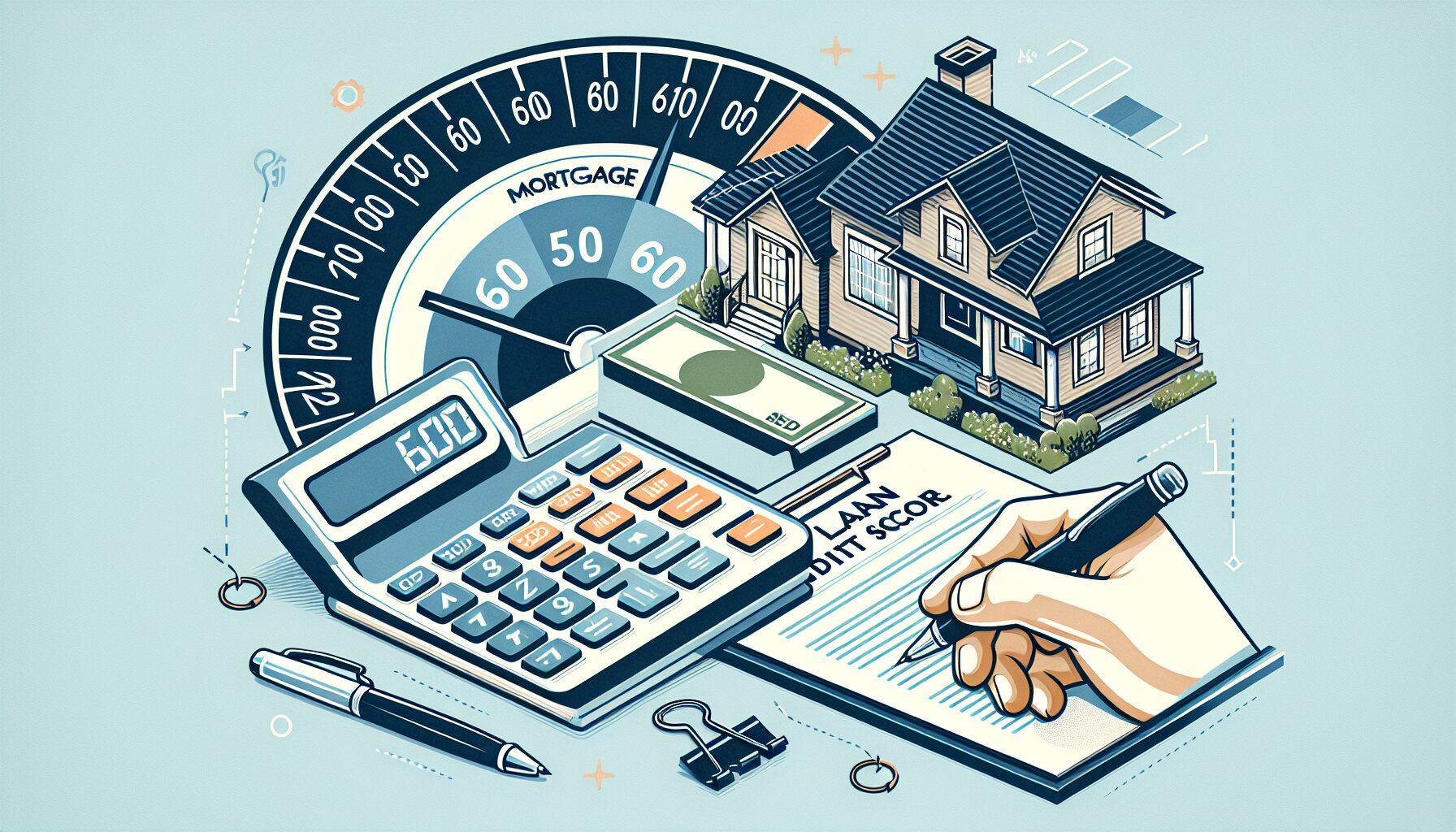
Purchasing a home is an exciting and significant milestone in anyone’s life. However, before taking the leap into homeownership, it’s crucial to understand the impact your credit score may have on your mortgage rate. If you find yourself wondering, “What mortgage rate can I get with a 600 credit score?”, fear not! In this article, we will explore the possibilities and provide you with valuable insights to help you navigate the world of mortgage rates with confidence.

Table of Contents
The Importance of Credit Scores
What is a credit score?
Your credit score is a numerical representation of your creditworthiness. It is a three-digit number that lenders use to assess the risk of lending you money. Credit scores are typically based on a variety of factors, including your payment history, credit utilization, length of credit history, types of credit, and new credit applications.
Why is a credit score important?
Your credit score plays a significant role in many aspects of your financial life. It not only impacts your ability to secure loans and credit cards but also affects the interest rates you qualify for. Lenders use credit scores to determine the level of risk associated with lending to you. A higher credit score often translates to lower interest rates, making borrowing more affordable in the long run.
How does a credit score affect mortgage rates?
When it comes to mortgages, your credit score can have a substantial impact on the interest rates you are offered. Lenders consider your credit score as a key factor in determining your mortgage rate. Generally, the higher your credit score, the lower the interest rate you can secure. A good credit score can potentially save you thousands of dollars over the life of your mortgage.
Understanding Credit Scores
What is considered a good credit score?
Credit scores typically range from 300 to 850, and what is considered a good credit score may vary depending on the lender or financial institution. In general, a credit score above 700 is considered good. However, different lenders may have different thresholds for what they consider a good credit score. It is always beneficial to strive for a higher credit score to increase your chances of getting the best mortgage rates available.
What is considered a bad credit score?
On the other end of the spectrum, a credit score below 600 is often considered bad or poor. Lower credit scores indicate a higher risk for lenders, which can result in higher interest rates or even difficulty in obtaining a mortgage. If your credit score falls into this range, it is essential to take steps to improve it before applying for a mortgage. This can involve managing your debts responsibly and making timely payments.
Factors Affecting Mortgage Rates
Credit Score
Your credit score is one of the most influential factors that lenders consider when determining your mortgage rate. As mentioned earlier, a higher credit score generally leads to lower interest rates. Lenders view borrowers with higher credit scores as less likely to default on their loan, making them a lower risk.
Debt-to-Income Ratio
Your debt-to-income ratio (DTI) is another critical factor in mortgage rate determination. This ratio compares your monthly debt payments to your monthly income. Lenders prefer borrowers with lower DTIs, as it indicates a lower risk of repayment issues. Keeping your DTI low by managing your debts and minimizing new debt can help improve your chances of securing a favorable mortgage rate.
Loan-to-Value Ratio
The loan-to-value (LTV) ratio considers the amount of the loan compared to the value of the property you are purchasing. Lenders prefer lower LTV ratios, as it means you have more equity in the property and are less likely to default on the loan. If you have a higher LTV ratio, such as when making a smaller down payment, you may be offered a slightly higher mortgage rate.
Employment History
Your employment history also plays a role in mortgage rate determination. Lenders prefer borrowers with stable employment, as it indicates a higher likelihood of stable income and ability to repay the loan. If you have a solid employment history, it can positively impact your chances of securing a lower mortgage rate.
Down Payment
The size of your down payment can also influence your mortgage rate. A larger down payment typically translates to a lower interest rate, as it reduces the loan amount and associated risk for the lender. Additionally, a substantial down payment can demonstrate your financial stability and responsibility, making you a more attractive borrower.
Minimum Credit Score Requirements for Different Types of Mortgages
Conventional Mortgages
Conventional mortgages are not insured or guaranteed by the government. These loans typically have stricter credit score requirements compared to government-backed loans. While the specific minimum credit score requirements for conventional mortgages can vary, a credit score of around 620 is often necessary to qualify. However, keep in mind that a higher credit score will generally result in better mortgage rates and more favorable terms.
FHA Loans
FHA loans are insured by the Federal Housing Administration and are designed to help borrowers with lower credit scores and smaller down payments. The minimum credit score requirement for an FHA loan is typically 580. However, borrowers with credit scores between 500 and 579 may still qualify but may be required to make a larger down payment.
VA Loans
VA loans are available to eligible veterans, active-duty military personnel, and surviving spouses. These loans are backed by the U.S. Department of Veterans Affairs and often have more flexible credit score requirements. While there isn’t a specific minimum credit score requirement for a VA loan, most lenders prefer borrowers with credit scores of 620 or higher.
USDA Loans
USDA loans are offered by the U.S. Department of Agriculture and are designed to help borrowers in rural areas. These loans have specific income limits and property eligibility requirements. While there isn’t a set minimum credit score requirement, most lenders prefer borrowers with credit scores of 640 or higher for USDA loans.

Average Mortgage Rates for Different Credit Scores
Mortgage rates for credit scores below 600
If you have a credit score below 600, you may face more difficulty in securing a mortgage. Lenders often consider borrowers in this credit score range to be high-risk, resulting in higher interest rates. While mortgage rates can vary significantly depending on other factors, it is not uncommon for borrowers with credit scores below 600 to be offered rates higher than the national average.
Mortgage rates for credit scores between 600 and 620
Credit scores between 600 and 620 still fall into the lower end of the credit score spectrum. Borrowers in this range may have limited mortgage options and may face higher interest rates compared to those with higher credit scores. It is crucial for borrowers in this range to carefully consider their options and work towards improving their credit scores before applying for a mortgage.
Mortgage rates for credit scores between 620 and 680
Credit scores between 620 and 680 are generally considered fair to average. While borrowers in this range may not qualify for the lowest mortgage rates available, they still have access to a wide range of loan options. Depending on other factors, such as employment history and down payment amount, borrowers in this credit score range can secure competitive mortgage rates.
Mortgage rates for credit scores above 680
Borrowers with credit scores above 680 typically have good to excellent credit. These borrowers are generally considered lower-risk by lenders, resulting in more favorable mortgage rates. With credit scores above 680, borrowers can access the best mortgage rates available in the market, potentially saving them a significant amount of money over the life of their loan.
Improving Your Credit Score
Pay bills on time
One of the most impactful ways to improve your credit score is to consistently pay all your bills on time. Late payments can have a negative impact on your credit score, so it’s crucial to prioritize timely payments.
Reduce credit card balances
High credit card balances can negatively affect your credit score. Aim to keep your credit card balances low in relation to your available credit. This can demonstrate responsible credit utilization to lenders and improve your credit score.
Keep credit utilization low
Credit utilization refers to the percentage of your available credit that you are using. Lenders prefer borrowers with low credit utilization, typically below 30%. Keeping your credit utilization low can help boost your credit score.
Avoid new credit applications
Applying for multiple new credit accounts within a short period can raise red flags to lenders and potentially lower your credit score. Avoid unnecessary credit applications, especially when you are preparing to apply for a mortgage.
Check your credit report for errors
Regularly reviewing your credit report is important to ensure its accuracy and identify any errors that may be negatively impacting your credit score. If you find errors, promptly dispute them with the credit reporting agencies to have them corrected.

Working with a Mortgage Lender
Discussing your credit score
When working with a mortgage lender, it is essential to openly discuss your credit score and any challenges you may face. Lenders can provide valuable insights and guidance on improving your credit score and taking steps to qualify for a mortgage.
Exploring mortgage options
A knowledgeable mortgage lender can help you explore different mortgage options that fit your specific circumstances. They can provide information on eligibility requirements, minimum credit score criteria, and available loan programs that best align with your goals.
Getting pre-approved
Before house hunting, it is advisable to get pre-approved for a mortgage. This involves submitting a loan application and providing the necessary documentation to a lender. Pre-approval not only helps you determine your budget but also demonstrates to sellers that you are a serious buyer.
Negotiating mortgage rates
Working with a mortgage lender can give you access to different loan options and the ability to negotiate mortgage rates. A skilled lender can guide you through the negotiation process, helping you secure the best mortgage rate possible based on your financial profile.
Alternative Options for Lower Credit Scores
Government-backed loan programs
If your credit score falls below the lender’s minimum requirements for conventional mortgages, you may be able to qualify for government-backed loan programs, such as FHA or VA loans. These loan programs often have more flexible credit score requirements, making homeownership accessible to a broader range of borrowers.
Co-signer or joint mortgage
Another option for borrowers with lower credit scores is to consider a co-signer or joint mortgage. Bringing in a co-signer with a higher credit score can potentially improve your chances of getting approved for a mortgage and securing a more favorable interest rate.
Improving credit score before applying for a mortgage
If time allows, it is beneficial to work on improving your credit score before applying for a mortgage. This can involve implementing the strategies mentioned earlier, such as paying bills on time, reducing credit card balances, and keeping credit utilization low. Taking steps to improve your credit score can lead to better mortgage options and more favorable rates.

Seeking Professional Advice
Consulting a mortgage broker
Mortgage brokers are professionals who work with multiple lenders to find the best mortgage options for their clients. Consulting a mortgage broker can provide valuable insights into the mortgage landscape and help you navigate the complexities of the process. They can offer advice tailored to your specific financial situation and help you find the best mortgage rates available.
Hiring a credit repair specialist
If you are struggling with credit issues, hiring a credit repair specialist may be beneficial. These professionals can work with you to identify and address errors on your credit report, negotiate with creditors, and develop strategies to improve your credit score. However, it is important to research and select reputable credit repair specialists.
Working with a financial advisor
A financial advisor can provide holistic guidance on improving your financial health and managing your credit. They can help you develop a comprehensive plan to improve your credit score, save for a down payment, and navigate the mortgage process. Working with a financial advisor can provide you with valuable insights and support during your homeownership journey.
Conclusion
Your credit score has a significant impact on your ability to secure a mortgage and the interest rates you are offered. Understanding the importance of credit scores, the factors that affect mortgage rates, and the options available can help you make informed decisions and work towards improving your creditworthiness. While obtaining a mortgage with a lower credit score may present challenges, there are various strategies and resources to help you overcome them. By focusing on improving your credit score, exploring mortgage options, and seeking professional advice, you can enhance your chances of obtaining a favorable mortgage rate and achieving your homeownership goals.








